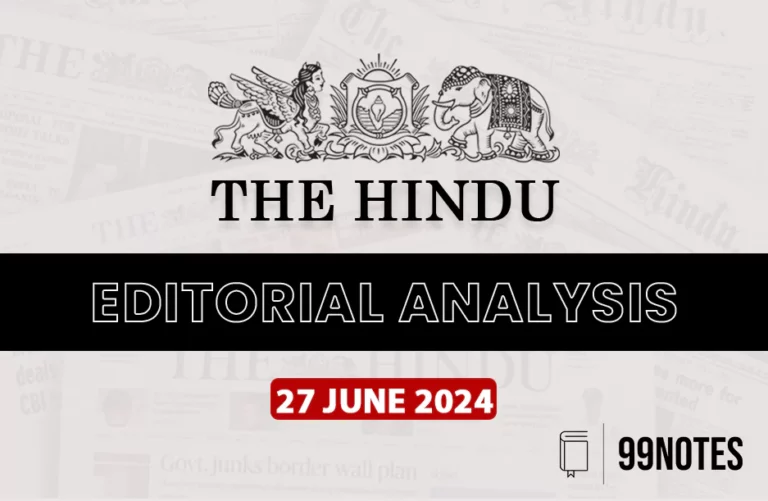8 August 2023 : The Hindu Editorial Notes PDF
The Hindu Editorial
8-August-2023
Daily Current Affairs For UPSC ,The Hindu Editorial Summary
1. Neither the right to privacy nor the right to information
Topic: GS2 – Indian polity.
Context:
- Nasscom, an industry body, believes that the Personal Data Protection (DPDP) Bill 2023 will boost the digital economy.
- However, critics argue that the real purpose of the Bill is to legalize data mining instead of safeguarding the right to privacy.
- It is being argued that, the Bill undermines the right to information, as it does not adequately protect privacy while accessing government documents.
Issues raised about The Data Protection Bill of 2022:
- Amendment to the RTI act: The Bill includes a provision to amend the Right to Information (RTI) Act, which has been empowering Indian citizens since its enactment in 2005.
- The enactment of a data protection law does not require any amendment to the existing RTI law, as noted by the Justice A.P. Shah Report on Privacy.
- The DPDP Bill 2022 proposes amendments to Section 8(1)(j) to exempt all personal information from disclosure, raising concerns about transparency and accountability.
- The government’s Power: The DPDP Bill 2022 empowers the executive to draft rules and notifications on a wide range of issues, potentially allowing arbitrary exemptions for certain entities and violating citizens’ privacy.
- Possibility of unfair treatment: The government could potentially exempt its cronies and government bodies like UIDAI, while others would have to comply with stringent data fiduciary obligations.
Issues over the Data Protection Board:
- The oversight body proposed under the DPDP Bill must be adequately independent to act on violations of the law by government entities.
- Issues overhead enemy of data protection board: The draft Bill lacks provisions to ensure the autonomy of the Data Protection Board responsible for enforcing the law.
- The central government is empowered to determine the strength, composition, and appointment process of the board, including the chairperson and other members.
- Autonomy of the Data protection board: The chief executive responsible for managing the board will be appointed by the government, giving it direct control over the institution.
- Potential for misuse of provisions:The creation of a government-controlled Data Protection Board, with the power to impose fines up to ₹500 crore, raises concerns of misuse to target political opposition and critics of government policies.
- Undermines the Right to Information Act 2005: by replacing the high benchmark for exemption with a broad definition of “information related to personal information.
- Lack of legal recourse: Unlike Europe’s General Data Protection Regulation (GDPR), the DPDP Bill 2023 does not address the issue of data collection, and citizens’ ability to seek legal recourse for privacy violations.
Way forward:
- Ensure transparency and public consultation: during the drafting of the DPDP Bill to address concerns and build public trust.
- Establish an independent and autonomous Data Protection Board: to enforce the provisions of the law and protect personal data effectively.
- Clearly define the provisions: regarding the composition, appointment process, and removal mechanisms of the Data Protection Board to prevent undue government influence.
- Strengthen provisions to protect citizens’ right to information: and ensure that the DPDP Bill does not compromise transparency and accountability.
- Conduct a comprehensive debate and discussion in Parliament: to address the shortcomings and implications of the Bill before its enactment.
Model question: Examine the key provisions and objectives of the Digital Personal Data Protection (DPDP) Bill in India. Discuss its potential implications for citizens’ right to privacy, data protection, and transparency. What measures can be adopted to ensure an effective balance between data protection and government’s access to data for legitimate purposes? (20 Marks)
2. Purging the nation’s data of politics
Topic: GS2 – governance.
Context:
- S. James, director of the International Institute of Population Studies, has been suspended for an investigation into recruitment practices in the institution.
- The suspension follows the publication of the fifth National Family Health Survey (NFHS-5) report produced by the institute.
- Speculations suggest that the government may be displeased with some of the findings in the NFHS-5 report.
- Past instances of data suppression in India’s national data agencies raise concerns about the credibility and transparency of data publication.
Reasons for government’s displeasure:
- Findings over increased anaemia levels: NFHS-5 report indicates a rise in anaemia levels across all sections of the population, especially among children and women in the age group 15-49.
- The high prevalence of anaemia does not align well with India’s aspiration to be the third-largest economy in the world.
- Issues over data related to open defecations: The figures for open defecation reported in 2019-21 show progress, but the percentage falls short of 100% by about a fifth.
- The government does not seem very happy with these findings – especially when massive efforts are being undertaken for eliminating these issues.
Consequences of surveillance of public data agencies:
- Impaired policymaking: Concealing or distorting data can hinder evidence-based policymaking, as decision-makers rely on accurate and timely information to formulate effective strategies and interventions.
- Lack of credibility: Surveillance of data agencies can erode their credibility, making it difficult for citizens and stakeholders to trust the accuracy and impartiality of official statistics.
- Inadequate response to crises: Concealment of critical data during epidemics or emergencies can lead to delayed or inappropriate responses, hampering efforts to address public health or socio-economic challenges effectively.
- Incomplete understanding of socio-economic issues: Suppressed or manipulated data may result in a distorted understanding of socio-economic issues, leading to flawed planning and resource allocation.
- Undermining democratic processes: Surveillance can hinder the democratic process by limiting access to crucial information.
Way forward:
- Strengthen data governance and institutional autonomy to safeguard data agencies from political interference.
- Conduct independent audits and evaluations of data collection and analysis processes to ensure data accuracy and reliability.
- Promote public awareness and advocacy on the importance of accurate data and its role in evidence-based policymaking.
- Enhance technical capacity and training for officials to improve data collection, analysis, and reporting practices.
- Collaborate with international agencies to adopt best practices in data protection and statistical governance.
- Establish clear and transparent criteria for data disclosure and publication, minimizing the risk of data suppression or manipulation.
- Engage civil society organizations and experts in data monitoring and verification to enhance data credibility and accountability.
- Foster a culture of open data sharing and accessibility to enable data validation and scrutiny by stakeholders.
Question: Discuss the potential impact of surveillance on public data agencies and its implications for the credibility of official reports. Provide recommendations to enhance data governance and protect data agencies from external interference to ensure reliable and accurate data for policymaking. (20 Marks)
Source: https://www.thehindu.com/opinion/op-ed/purging-the-nations-data-of-politics/article67168711.ece
3. Superconducting hype: On South Korea’s LK-99
Topic: GS3 – Science and technology
Context:
- South Korean researchers announced the discovery of LK-99, a material claimed to be a room-temperature superconductor at ambient pressure.
More about the new finding:
- Conventional superconductors can transport electric current with zero loss but require extremely low temperatures and pressure.
- LK-99’s claim of room-temperature superconductivity has sparked excitement due to its free-to-access preprint papers with promising data.
- The importance of independent verification is crucial for such valuable and prestigious discoveries.
Possible applications of the discovery:
The discovery of a room-temperature superconductor, if verified and confirmed, could have significant applications across various fields. Some potential applications include:
- Revolutionizing power transmission and distribution systems.
- Enabling high-speed transportation with Maglev trains.
- Enhancing medical devices like MRI machines.
- Supporting energy storage systems and grid stabilization.
- Advancing computing and data storage technologies.
- Propelling quantum computing and communication
- Utilizing in aerospace and defense applications.
- Enhancing industrial processes and automation.
- Contributing to reducing greenhouse gas emissions.
Question: What are the potential applications of room-temperature superconductors?
For Enquiry

8 August 2023 : The Hindu Editorial Notes PDF

8 August 2023 : Daily Current Affairs

7 August 2023 : Daily Quiz

7 August 2023 : PIB

7 August 2023 : The Hindu Editorial Notes PDF

7 August 2023 : Daily Current Affairs

5 August 2023 : Daily Quiz

5 August 2023 : The Hindu Editorial Notes PDF

5 August 2023 : PIB

5 August 2023 : Daily Current Affairs
August- The Hindu Editorial 8 August 2023 : The Hindu Editorial Notes PDF The Hindu Editorial
7-August-2023
Daily Current Affairs For UPSC ,The Hindu Editorial Summary
Facebook-f
Twitter
Youtube
1….
August Daily Current Affairs 8 August 2023 : Daily Current Affairs Daily Current Affairs
8-August-2023
Daily Current Affairs For UPSC ,Daily Current affairs of The hIndu…
Daily Quiz 7 August 2023 : Daily Quiz 7 August 2023 : Daily Quiz…
August PIB 2023 7 August 2023 : PIB PRESS INFORMATION BUREAU
7-August -2023
Daily Current Affairs For UPSC ,The PIB ( Press Information Bureau…
August- The Hindu Editorial 7 August 2023 : The Hindu Editorial Notes PDF The Hindu Editorial
7-August-2023
Daily Current Affairs For UPSC ,The Hindu Editorial Summary
Facebook-f
Twitter
Youtube
1….
August Daily Current Affairs 7 August 2023 : Daily Current Affairs Daily Current Affairs
7-August-2023
Daily Current Affairs For UPSC ,Daily Current affairs of The hIndu…
Daily Quiz 5 August 2023 : Daily Quiz 5 August 2023 : Daily Quiz…
August- The Hindu Editorial 5 August 2023 : The Hindu Editorial Notes PDF The Hindu Editorial
5-August-2023
Daily Current Affairs For UPSC ,The Hindu Editorial Summary
Facebook-f
Twitter
Youtube
1. The…
August PIB 2023 5 August 2023 : PIB PRESS INFORMATION BUREAU
5-August -2023
Daily Current Affairs For UPSC ,The PIB ( Press Information Bureau…
August Daily Current Affairs 5 August 2023 : Daily Current Affairs DAILY CURRENT AFFAIRS
Daily Current Affairs For UPSC ,Daily Current affairs of The hIndu and Indian Express.
5-August-2023
Facebook-f
Twitter
Youtube
1. SC…


